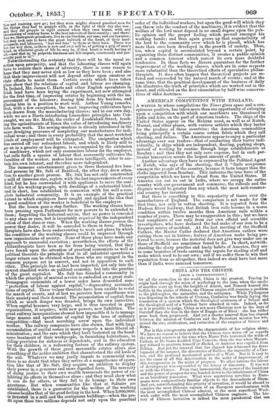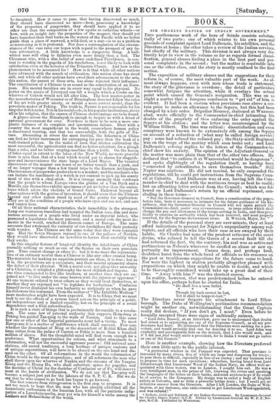CHINA AND THE CHINESE.
[FROM A CORRESPONDENT]
OF all the anomalies in the world, China is the greatest. Tracing its origin back through the mists of mythology to the time when the smoke of sacrifice went up from the heights of Ararat, and Nimrod hunted the buffalo in the plains of Shiner, the Chinese empire still remains a problem to the philosopher, the naturalist, and the antiquary. While Pythagoras was disputing in the schools of Crotona, Confucius was firmly laying the foundation of a system which the theological acuteness of a Schaal and the theological zeal of a Verbiest have attacked in vain. Indeed, as far as it is possible to judge, China is not more Christian now in the days of Gutzlaff than she was in the days of Ruggio or of Ricci : she has rather gone back than progressed. And yet a shorter interval than has elapsed between the mission of Confucius and the Protestant mission has wit- nessed the rise, civilization, and extinction of the empires of Greece and Rome. Nor is this retrogressive spirit the characteristic of her religion alone. We have no reason to believe that the Chinese were worse off as regards the arts and sciences at the time when Marco Polo traversed the wilds of Cathay, or De Gania doubled Cape Comorin, than she was when Macart- ney refused to prostrate himself at Zhehol, or Amherst was expelled from Peking. And yet the interval that has elapsed has witnessed the deve- lopment of the magnet, the discoveries of Galileo, the ingenuity of a Cax- ton, and the profound mechanical genius of a Watt. Nor is it easy to see the cause of all this deterioration in the midst of improvement, of this retrogression in the midst of progress. To other nations the labour of development was superadded to the labour of discovery. It was not so with the Chinese. From time immemorial, the power of the loadstone and the power of gunpowder was handed down to the inhabitants of China as an hereditary possession. What were mysterious novelties to Euro- peans were comparatively familiar objects to the descendants of Sham. And yet, notwithstanding this priority of invention, it would be absurd to compare the most illiterate captain of an European merchantman with the most accomplished Chinese admiral, or the most superficial Wool- wich cadet with the most accomplished Chinese engineer. The his- tory of Chinese invention is indeed the most paradoxical that can In imagined. How it came to pass, that having discovered so much, they should have discovered no more—how, possessing a knowledge of the properties of gunpowder, they should have applied it to no other use than the composition of a few squibs or catherine wheels—or how, with an insight into the properties of the magnet, they should yet have launched their frail barks on the waters of the Pacific with no better guide than a piece of seaweed, a wild-bird, or a star—is to us a problem as interesting as it is profound. Nor does a contemplation of the circum- stances of the case raise our hopes with regard to the prospect of any fu- ture reformation. A little knowledge is a dangerous thing. A half- witted man will cling to fallacies even more firmly than a fool. The Chinaman who, with a dim belief of some undefined Providence, is con- tent to worship in the pagoda of his forefathers, is not likely to look with satisfaction even at the heresies of the Trimetrie Classic. And how is this phenomenon to be accounted for ? How is it that while all other nations have advanced with the march of civilization, this nation alone has stood still, and while all other nations have owed their advancement to the arts, this nation, the parent of those arts, has alone rejected their influence ? The constitution of a Chinese is as sound as the constitution of an Euro- pean. His mental faculties are in every way equal to his physical. No porter on the quays of Liverpool can lift a weight which a Coolie on the wharves of Canton would not lift after him. The best master-potter in the manufactories of Worcester or of Birmingham does not follow the rules of his art with greater nicety, or mould a more correct model, than the porcelain-maker of Peking. The truth is, Nature is not responsible for his singular deficiencies. It is in his social code, in his popular institutions, above all in his religion, that the causes of Chinese shortcomings are to he found. A glance across the Himalayah is enough to inspire us with a dread of paternal government for ever. Nowhere is there to be seen a more em- phatic instance of its complete and ignominious failure. Blest with a country the most magnificent in the world, everywhere human policy is discovered warring, and that too successfully, with the gifts of Na- ture. Abounding in rivers the most fruitful, the fishermen of China can find no better instrument for entrapping his prey than the beak of a well-trained pelican. In the midst of land that invites cultivation the most successful, the agriculturist can find no better substitute for a plough than a rake, and no better reaping-machine than a knife. On the bosom of lakes equal in extent to the lakes of the New World, no more graceful form is seen than that of a boat which would put to shame for sluggish- ness and inconvenience the state barge of a Lord Mayor. The vaunted discoverers of the magnet can boast of no better vessels than a junk, and of no longer voyages than a few timid trips to the Eastern Archipelago. The inventors of gunpowder prefer a bow to a musket; and the mechanic who can imitate the machinery of a watch is yet content to pick up his scanty meal of rice with a chop-stick. It is a strange anomaly that confesses that the people to whom Europe owes the glories of a Van Dyck and a Murillo can themselves exhibit specimens of art no better than the carica- tures which adorn the obelisks of Grand Cairo. Endowed beyond all other nations with the genius of invention, it should seem that the Chinese
ond any other nation stand in need of the genius for application. They are in the condition of a people who have eyes and see not, and ears and cannot hear.
Of all their national characteristics, their immobility is the strongest. Long ere venturous travellers had tempted the Indian seas, dim and mys- terious accounts of a people who lived under an imperial father, who possessed a legislature the most paternal, and a moral code the most do- mestic in the world, reached the Eastern corner of Europe. The same accounts that awakened the curiosity of our forefathers fill their posterity with wonder. The Chinese are the same today that they were centuries ago. Had the Seven Sleepers reposed in one of the palaces of Nankin, they would have discovered no novelties to harass their credulity when they awoke.
In this singular feature of longieval identity the inhabitants of China resemble nothing so much as one of the figures on their own porcelain jars. Time cannot change or efface it ; but it is no more the representa- tive of an ordinary mortal than a Chinese is like any other created being. The materials for making an exquisite portrait are there, it is true; but as it is, the proportions are a caricature, and their mental symmetry shares the defect of their physical. With a moral code not altogether unworthy of a Christian, is mingled a philosophy the most childish and impure. At one time commanded to live like brothers, at another time they are en- joined not "to live under the same heaven with the injurer or oppressor." At one moment ordered to treat others as they would treat themselves, at another they are enjoined not "to legislate for barbarians." Confucius himself never displayed his own barbarity so strikingly as when he gave his followers this command. From the author of "The Infallible Medium" more moderation might have been expected. It is to China that we must look to see the effects of a system based not on the principle of a politi- cal independence and a limited equality, but on the principle of a social dependence and a filial subordination.
It is such a state of things that is preeminently favourable to a revolu- tion. The same law of paternal authority that supports Hein-fung at Peking has guided Tae-ping to the walls of Nankin. And to this same law one or other of the Imperial patriarchs must fall a victim. To most Europeans it is a matter of indifference which shall succeed. Few care whether the descendant of Ming or the descendant of Koblai Khan shall iisue orders from the palace of Canton or Pekin to more than a hundred million of slaves. But the thoughtful mind will find room enough for a preference. What opportunities for reform, and what stimulants to a reformation, will not the successful aggressor possess ! Old national asso- ciations, old sacred traditions, a long heritage of antique customs and of antique superstitions, will have to be abused on the one hand and dis- used on the other. Of all reformations in the world the reformation of China would be the most stupendous ; and of all reformers the man who shall throw open the wharves of Nankin and the streams of the Yangtse Kiang and the Hoang Ho, who shall substitute spires for pagodas, and the doctrine of Christ for the doctrine of Confucius or of Fo, will deserve most at the hands of civilization. We do not say that Tae-ping will become a subject just yet for the labours of the S. P. C. K. But we do say that he who ceases to go back has begun to go forward.
The first remove from retrogression is the first step to progress. It is not too much to hope that the man who has already exhibited all the
iconoclastic enthusiasm of the Isaurian Leo, with all the patriotic indig- nation of a Larochejacquelin may yet win for himself a niche among the Luthera and lielanethons of world.



























 Previous page
Previous page